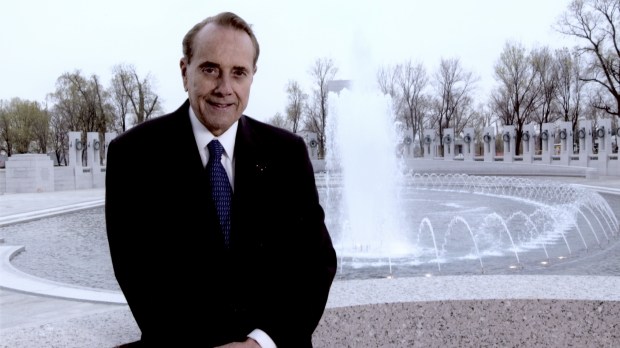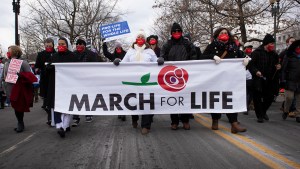Lenten Campaign 2025
This content is free of charge, as are all our articles.
Support us with a donation that is tax-deductible and enable us to continue to reach millions of readers.
Senator Robert J. Dole, the one-time presidential candidate and longtime leader in the United States Senate, died Sunday at the age of 98. A veteran of the Second World War who suffered a serious injury, he spent his life advocating for both veterans and the disabled. He also took a keen interest in the issue of hunger, and was instrumental in legislation helping the hungry to put food on the table.
He was, in 1996, the last of the World War II generation to win the Republican Party’s nomination for president.
Robert Joseph Dole was born July 22, 1923, the second of four children born to Doran and Bina Dole of Russell, Kansas, a small town on the plains of western Kansas. Like so many Kansans of the time, the Doles lived precariously amid the Dust Bowl and Depression of the 1930s. A $300 loan from a Russell banker enabled Bob to enroll at the University of Kansas in September 1941. Thereafter he scrambled to support himself while pursuing his studies and lettering in football, basketball and track.
Shortly after Pearl Harbor, Dole left the University of Kansas to join the Army’s Enlisted Reserve Corps. Called to active duty in June of 1943, he entered officer candidate school at Fort Benning, Georgia. Soon he was on board a troop ship headed for Italy. In February 1945, Second Lieutenant Dole was sent to fill a vacancy in Company I Third Battalion, Tenth Mountain Division. This famed Division was tasked with dislodging German troops from deeply entrenched positions in the Apennine Mountains north of Bologna.
Long recovery
On the morning of April 14,1945, Dole led his platoon up the heavily mined slopes of Hill #913. While retrieving the lifeless form of his platoon’s radio man, Dole was severely wounded by enemy fire. His right arm was shredded, and his collarbone crushed. Paralyzed from the neck down, Dole lay where he fell for 10 hours, until he could be evacuated to a field hospital in Pistoia.
Ahead of him stretched 39 months of hospitalization, progress and setback. Dole drew inspiration from the song “You’ll Never Walk Alone,” from the Rodgers and Hammerstein play “Carousel,” a song he played endlessly. It would become a personal anthem. He was hospitalized with two veterans who would become close friends and colleagues in the Senate, Daniel Inouye (HI-D) and Phil Hart (MI-D).
Unable to use his right arm and barely able to walk, Dole underwent a grueling series of innovative surgeries. He recovered the use of his left arm, though not his right. To help defer related expenses, the people of Russell, Kansas, established the Bob Dole Fund. Friends and neighbors placed whatever they could give in an old cigar box located at Dawson’s drugstore. The cigar box remained a treasured possession throughout his life.
Returning to Kansas to recuperate, Dole married his physical therapist, Phyllis Holden, in 1948. While still a student at Washburn Law School in Topeka, he was elected to the Kansas House of Representatives in 1950. Rather than seek re-election, he returned to Russell, entered private law practice and was elected District Attorney. In 1954, the Doles welcomed the birth of their daughter, Robin. In 1972, he and Phyllis divorced.
Off to Washington
Dole won his first congressional race in 1960. Over the next eight years, he established a reputation as a staunch fiscal conservative who also supported the 1964 Civil Rights Act and the Voting Rights Act of 1965. Years later he would count among his proudest achievements serving as floor manager in the Senate for legislation authorizing the birthdate of the Reverend Martin Luther King as a national holiday. Dole was instrumental in Representative Gerald Ford’s election as House Minority Leader early in 1965. At the same time, he established an enduring relationship with future president Richard Nixon.
In 1968, Dole was elected to the U.S. Senate. His support of President Nixon earned him the chairmanship of the Republican National Committee, which he held until 1972.
On December 6, 1975, Dole married Elizabeth Hanford, a member of the Federal Trade Commission.
In 1976, President Gerald Ford selected Bob Dole to be his Vice-Presidential running mate. Immediately after the GOP convention in Kansas City, the new ticket made its first joint appearance at an emotional homecoming in Dole’s beloved Russell. The ticket narrowly lost in November to former Georgia Governor Jimmy Carter and Minnesota Senator Walter Mondale (D-MN).
With Ronald Reagan’s landslide presidential victory in 1980, Dole, for the first time, was part of a Senate majority. As chairman of the powerful Senate Finance Committee, he helped shape and enact the Reagan program of tax and spending cuts. Dole was an early and fervent opponent of deficit spending in the Congress, warning of the dangers of accumulating deficits on the floor of the U.S. Senate and in his Senate and presidential campaigns.
He also worked with Senator Daniel Patrick Moynihan (NY-D) to craft legislation in 1983 to preserve the Social Security System from bankruptcy. He also partnered with Senator George McGovern (SD-D), to create the Food Stamp program and the International Food Aid Program. Dole joined McGovern to promote a global school lunch program and other hunger and nutrition initiatives.
Advocating for the disabled
As someone who had a lifelong disability, Dole advocated for the rights of individuals with disabilities. Caring for the disabled was the subject of his maiden speech in the Senate. He partnered with Senator Nancy Kassebaum (KS-R) and Tom Harkin (IA-D) to secure enactment of the Americans with Disabilities Act in 1990 providing millions of Americans with public access and employment opportunities that were previously foreclosed. He also worked to ensure that those disabled who sought to return to the workforce continued to qualify for Medicaid, so that they received the health care they needed to be productive members of society. Dole fought long and hard for Senate ratification of the International Treaty for People with Disabilities.
Dole also sponsored numerous legislative initiatives benefiting America’s veterans, such as the Veterans’ Benefits Improvement Act and the Veterans Health Care Administrative Flexibility Act.
In 1984, Dole became Senate Majority Leader and would serve as Republican leader (Majority and Minority Leader) for 12 years, under three presidents: Reagan, George H.W. Bush and Bill Clinton. In 2018, Dole was presented with the Congressional Gold Medal. This award was a result of legislation, cosponsored by all 100 members of the Senate and passed in the House of Representatives and then signed into law by President Donald Trump. It noted that “throughout his life-long service to the country, Bob Dole has embodied the American spirit of leadership and determination, and serves as one of the most prolific role models both in and outside of politics.”
Having conducted a brief, unsuccessful campaign for president in 1980, Dole geared up for a more serious run in 1988. As Vice President Bush’s principal opponent, Dole won the Iowa caucuses, but lost to Bush in a fiercely contested New Hampshire primary when he refused to sign the “No-New-Taxes Pledge” because of his concern about deficit spending. In time, the two men developed a strong working relationship and friendship, with President Bush later calling Dole “a great Republican Leader, as great as any in the past.”
In 1996, it would be Dole’s turn. Nominated to run against a popular President, Bill Clinton, Dole presented himself as “the most optimistic man in America.” Having resigned his seat in the Senate and his position as Majority Leader in order to devote his full energies to the campaign, Dole gradually narrowed the incumbent’s large lead, but on November 5, 1996, he came up short. A few weeks later Clinton awarded Dole the Presidential Medal of Freedom in recognition of his contributions to the nation.
On Catholic issues
Dole was not Catholic, but during the campaign, he addressed the Catholic Press Association in Philadelphia, criticizing Clinton’s decision to veto legislation banning late-term abortions. Dole also unveiled a proposed tax credit for charitable deductions to help the poor.
Just before the general election that November, the Archdiocese of New York broke with tradition by disinviting both Clinton and Dole to address the Al Smith Dinner. The move was thought to be due to Cardinal John O’Connor’s anger with Clinton for vetoing the partial-birth abortion ban. In order to maintain a semblance of partiality, the archdiocese also apparently reneged on Dole’s invitation as well. Dole had addressed the dinner as the single keynoter in 1993, however.
In place of Dole and Clinton in 1996, the speakers were Vice President Albert Gore and Dole’s running mate, Jack Kemp.
In later years, Dole was engaged in lobbying and advertising. In 2009, he partnered with three other former Senate Majority Leaders — Tom Daschle (SD-D), George Mitchell (ME-D) and Howard Baker (TN-R) — to create the Bipartisan Policy Center in Washington. Together they developed the Leader’s Health Care Project, a series of recommendations on reform of America’s healthcare system.
Nothing he did in later life gave Dole more satisfaction than his leadership role in realizing the long-deferred dream of a National World War II Memorial on the Washington Mall (in photo above). For the better part of a decade, he spearheaded with Fred Smith of FedEx and the help of many, a massive $185 million fundraising effort to underwrite the Memorial’s design, construction, and maintenance. By the time of its dedication in June 2004, Dole had become, for many Americans, the face, voice and personification of what Tom Brokaw called “The Greatest Generation.” In subsequent years, Dole continued his involvement, as Honorary Advisor to Honor Flight Network, which flies World War II and other veterans to Washington who, for financial or medical reasons, would not otherwise be able to experience their Memorial. Over the years, Dole and his wife Elizabeth personally welcomed thousands of veterans as they arrived at the World War II Memorial. In June 2009, the Doles accepted President Barack Obama’s invitation to accompany him to Normandy for ceremonies marking the 65th Anniversary of D-Day.
Following the attacks of September 11th, Dole joined forces with former rival Bill Clinton to co-chair the Families of Freedom Scholarship Fund. He also served as Honorary co-chair of the President’s Council on Service and Civic Participation, part of President George W. Bush’s USA Freedom Corps.
In 2007, Dole co-chaired with Secretary Donna Shalala, the President’s Commission on the Care of America’s Returning Wounded Warriors, established in the wake of revelations about inadequate care afforded to some Iraqi war veterans. The Commission offered groundbreaking recommendations on the management of care for our wounded and injured service members.
Dole’s best-selling World War II memoir, One Soldier’s Story, chronicles his harrowing experience on and off the battlefield. It was written to provide the lessons learned through his struggle to survive and to inspire today’s disabled veterans with the knowledge that they, too, can live productive and fulfilling lives. He also authored the books Great Political Wit: Laughing (Almost) All the Way to the White House, Great Presidential Wit: I Wish I Was In The Book, and Unlimited Partners, an autobiography co-written with his wife, Elizabeth.
Dole is survived by his wife, Elizabeth Hanford Dole, his daughter, Robin Carol Dole, nine nieces and nephews and their families.



